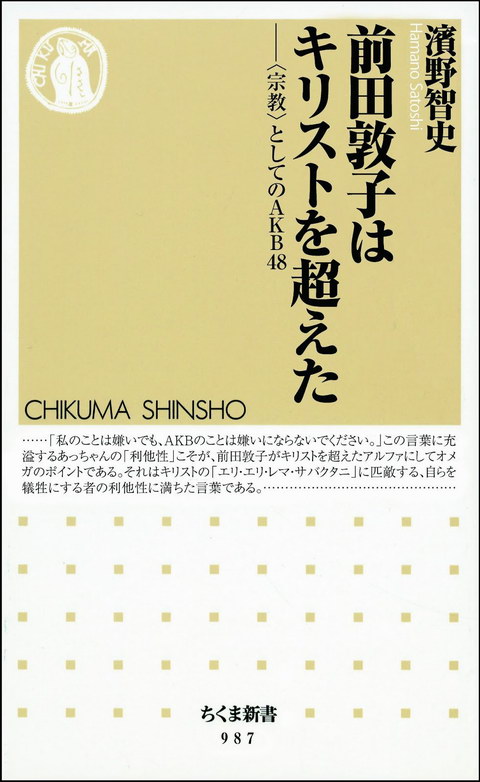Forum Replies Created
-
AuthorPosts
-

Ooh, that’s a lot of corrections. But then it’s a lot of writing, and the second guy said he was specifically correcting heavily. How long did it take to write? And how come you’ve been slacking off?
When you basically understand more or less everything you hear and read given the topic isn’t related to a special field like the Mandart inellipse, I think you’ll be the same. Probably 30min to an hour or more.
AKB48 aren’t going to learn English for YOU, you know ;)

http://youtu.be/jNtMaaX_9e8?t=8s

Decided to write a lang8 journal based on something I thought. Also since I haven’t done one in around 8 months.
Been slacking off a lot lately but I was about to knock off the 74 reviews that I had on Anki that’s been accumulating for the past week or so.
EDIT: oh, got massively owned on my lang8 journal

 March 18, 2013 at 8:02 pm in reply to: The "I found some Japanese I don't understand" thread. #39148
March 18, 2013 at 8:02 pm in reply to: The "I found some Japanese I don't understand" thread. #39148Compound words in English = “straightforward”, “railroad”, “underground”
Strictly speaking, no. I can see where you are drawing comparison and if it helps you remember strings of nouns in Japanese, then sure.

not sure if srs either
 March 17, 2013 at 9:35 am in reply to: The "I found some Japanese I don't understand" thread. #39128
March 17, 2013 at 9:35 am in reply to: The "I found some Japanese I don't understand" thread. #39128His: 〇“今は、マッサージテーブルの上で日本語をべんきょうしています。”
Now, (I am) studying on top of the of the massage table
Because your sentence has huge grammatical errors, an English equivalent can not represent what you have written. Instead let’s list what’s wrong.
You: ד今、マッサージのテーブルに上日本語をべんきょうです。”
・It’s ok as just ”マッサージテーブル”
You can, however, have a string of nouns placed together when they’re not meant to modify each other. For example, in a phrase such as “International Education Center” you can see that it is just a string of nouns without any grammatical modifications between them. It’s not an “Education Center that is International” or a “Center for International Education”, etc., it’s just “International Education Center”. In Japanese, you can express this as simply 「国際教育センタ」 (or 「センター」). You will see this chaining of nouns in many combinations. Sometimes a certain combination is so commonly used that it has almost become a separate word and is even listed as a separate entry in some dictionaries. Some examples include: 「登場人物」、「立入禁止」、or 「通勤手当」. If you have difficulties in figuring out where to separate the words, you can paste them into the WWWJDICs Translate Words in Japanese Text function and it’ll parse the words for you (most of the time)
http://www.guidetojapanese.org/learn/grammar/clause・マッサージテーブルの上に is essential
Where on the massage table? On top, or the top of the message table. I think you are writing it extremely direct translation and thats a no no.
↓
↓
↓
-マッサージのテーブル | you used の because you learned it can also be used to describe something. that’s fine but the native suggests that you chain the two nouns together
-に上 | に[on] 上[top] ????
-日本語をべんきょうです。 | conflicts in grammar. you are attempting to describe the action of something (を) yet affirming the state of something (です) in the same phrase. The time when you can use both would be in the phrase 「日本語を勉強中です」. Otherwise, choose one.
Yeah, unlike Mark’s Ipad


It’s easier to read than that Maeda Jesus book and less boring
This Maeda Jesus book


My weapon of choice this round:

Extensive reading, to be exact, refers to reading large volumes of material at or very slightly above one’s comprehension level, aiming for overall understanding of the work instead of worrying about every detailed twist of grammar or every word. This approach stresses learning from context and getting used to the language by massive exposure instead of understanding things point by point. It does not replace its opposite, intensive reading (in which a difficult point or a sentence well above the learner’s level is studied in detail); but rather is a vital supplement. In fact, intensive reading and study should instead be viewed as a supplement to extensive reading, which turns the normal classroom paradigm on its head.
http://readmod.wordpress.com/about/


GOGOGOGOGOGOGOGOGOGO

Good luck to you and me then! In the last contest, I got extremely sick with the flu so I was focused on getting better and basically dropped 20 spots, leaving me in 44th place.
 March 11, 2013 at 2:39 pm in reply to: The "I found some Japanese I don't understand" thread. #39020
March 11, 2013 at 2:39 pm in reply to: The "I found some Japanese I don't understand" thread. #39020In the world of slang, anything goes and rules that apply to written Japanese are often broken. The most difficult part is that, of course, you can’t just say whatever you want. When you break the rules, you have to break it the correct way. Taking what you learned from textbooks or Japanese classes and applying it to the real world is not so easy because it is impossible to teach all the possible ways things can get jumbled up in the spoken language. Learning how to speak naturally with all the correct idiosyncrasies and inconsistencies in a language is something that requires practice with real people in real-world situations. In this section, we’ll look at some common patterns and themes that will at least help you get an idea of where the majority of slang originates from.
One thing you’ll soon realize when you first start talking to Japanese people in real life is that many sounds are slurred together. This is especially true for males. The fact is voices in instructional material such as language tapes often exaggerate the pronunciation of each letter in order to make aural comprehension easier. In reality, not all the sounds are pronounced as clearly as it should be and things end up sounding different from how it’s written on paper.
There is one major driving factor behind the majority of slang in Japanese. The primary goal of most slang is to make things easier to say. In other words, the goal is to reduce or simplify the movement of your mouth. There are two primary ways in which this is accomplished, 1) By making things shorter or, 2) By slurring the sounds together. We have already seen many examples of the first method such as shortening 「かもしれない」 to 「かも」 or preferring 「と」 to the longer conditional forms. The second method makes things easier to say usually by substituting parts of words with sounds that fit better with the sounds surrounding it or by merging two or more sounds together. For example, the same 「かもしれない」 might be pronounced 「かもしんない」 since 「しん」 requires less movement than 「しれ」.
The fundamental goal of slang is to reduce mouth movement
-
AuthorPosts
